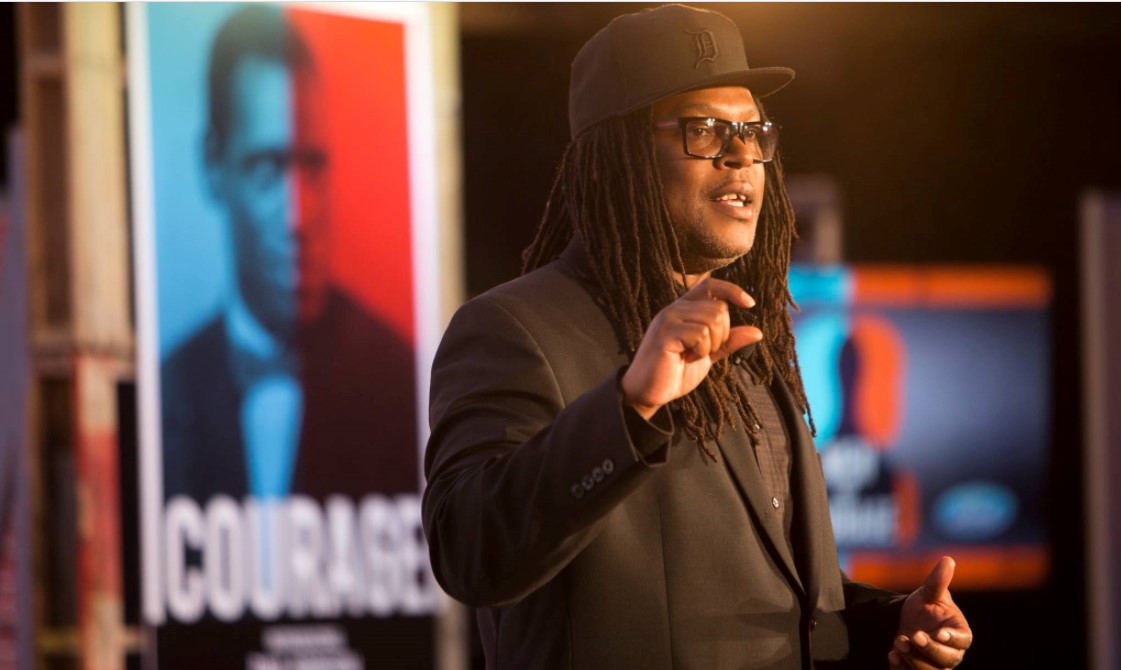on
Detroit native Shaka Senghor penned a book, “Letters to the Sons of Society: A Father’s Invitation to Love, Honesty, and Freedom,” to inspire his children to learn more about him and rebuild up the truths of what men are all about.

Photo courtesy of Shaka Senghor
By Sherri Kolade
Dear Black man, you’re good enough. Dear fathers, you’re strong and capable beyond measure.
Detroit native Shaka Senghor, who has a way with words, wants to encourage men and fathers that despite negative stereotypes — resounding throughout the media – they are worthy, and their presence is impactful, especially in their sons’ lives.
Senghor, a New York Times bestselling author, is using his creative, expressive talents to share his heartfelt words to men – especially Black men — who have borne the brunt of these negative dad tropes in his recently released book, “Letters to the Sons of Society: A Father’s Invitation to Love, Honesty, and Freedom.”
His book details how healing, affection, love and second chances as a father can all shape a more holistic world where transformation can take place.
Senghor’s book, full of letters to his children Jay and Sekou, also reveals tales of his sometimes-perilous journey as a Black man in America while unlearning toxic masculinity and how to tap into something greater while navigating fatherhood.
“My inspiration for writing the book is really thinking about the narrative of Black men and Black boys,” Senghor, who now lives in California, said, adding that he has mentored young men around the country (and around the world) and noticed common themes. “One thing that consistently comes up for me is we are either identified as America’s problem to solve, Black women’s problem to solve or the world’s problem to solve – never anybody’s solution.”
Senghor added that Black men, who are the solution, have done “incredible work” and even from the mundane moments to powerful ones – their humanity needs to be recognized.
In the decade since his prison release, he has started and worked with nonprofits seeking to encourage people, visited the White House, been interviewed by Trevor Noah and Oprah Winfrey, given award-winning TED talks and worked to help create personal and societal change.
Through his book, Senghor also wants his sons to know more about him, especially after being incarcerated for 19 years for second-degree murder when his oldest (now 30) was just six months old.
“[There is] a lot of about my life I want him to understand,” he said of his oldest.
His book, which also features a letter-writing campaign, #MyFatherIsDope, in partnership with the Boys & Girls Clubs of Southeastern Michigan (BGCSM), is a movement that invites fathers to share their own perspectives through letters submitted to his website about raising children. The nationwide call kicked off on Monday, January 17, and is running through June.
The national campaign that will develop a signature coffee table book that will be distributed nationally for Father’s Day 2022, according to a press release. All proceeds will go back to support programming, membership and operations for the Boys & Girls Clubs of Southeastern Michigan.
“We really are excited about sharing these letters from our perspective — a lot of times we don’t hear true perspectives about dads,” Senghor said.
“Fatherhood is more than a word, and it’s not just biological. Father figures are the cornerstones in the lives of many youths, especially Black and Brown youth,” said Shawn H. Wilson, president and CEO of BGCSM. “Collaborating with Shaka to find a way to amplify and encourage the many fathers around the nation is an exciting and impactful experience. Shaka, BGCSM and I look forward to uplifting the voices of our diverse fathers and hope more will submit their own letters too.”
“The work that the BGCSM team is doing is aligned with my passion as a mentor and a dad. It’s a natural extension of what I believe my purpose is as an ambassador of literature and social impact investor,” Senghor added.
Senghor also told the Michigan Chronicle that while he promotes positivity in his book, he doesn’t want to ignore the stereotypes that have especially plagued Black men for years – but he’s not looking to change the narrative.
He said that, through his book, he is speaking the truth about who Black men are and wants to “expand that narrative” where Black men and men in general are painted with a more accurate brush of who they are as people – even with the flaws.
“[We have to] speak to the truth about who we are,” he said adding that like any other human beings, Black men, too, are complex. “Some of the things said about us have been true. But that’s not all of who we are. Real growth happens when you can be honest about all of who you are as opposed to segments you’re comfortable with or uncomfortable with.”
Senghor is also a lecturer at universities, a voice for criminal justice reform and the New York Times bestselling author of “Writing My Wrongs: Life, Death, and Redemption in an American Prison.”
Find out more information or to purchase the book visit https://www.shakasenghor.com/.
Join our email list to stay connected.






